
Day 4 – Residency
The Great Awakening
Who was I and who was I becoming before March of 2020?
I have been a leader and entrepreneur in information technology since 1997 and in higher education since 2011. This is who I was before March of 2020. In January of 2020, I was working as a Professor and a Sr. Systems Engineer. I have been working multiple jobs since 9/11/2001. That date has significance to many people. I was laid off from my job because I had a college degree and my co-worker did not. I was told I would be able to find another job faster than he could. From that day forth, I decided to work more than one job at a time for fear of a loss of income. I also started a managed security services company (https://theonyxitgroup.com). The purpose of the company is to ensure a certain income and provide my clients with the cybersecurity resources required to protect their resources. Who I was and who I am are the same person.
Who have I become during the pandemic?
I have always been somewhat of an introvert. The pandemic allowed the introvert in me to flourish. I was able to work from home and at a pace that worked for me. I was able to focus without hearing side conversations around my desk. I was able to stay in the house for days at a time. I have become a super introvert. I can complete more work from home than I can in the office. At home, I work until all tasks for the day are complete. In the office, I would take multiple breaks to clear my head. If work was not completed within 15 minutes of quitting time, I started packing up and would complete it the next day. I think the pandemic has allowed me to become a better employee and live a stress-free work life.
Who do I want to become now that the world is open again?
My goal is to complete my doctorate and focus on conducting research on things that need to be discussed. For example, a philosophy doctorate should not outrank a practitioner doctorate in information technology. Undergrad students should be learning the skills required to gain a career versus learning how to do a job in theory. I have noticed when students reach my courses in their senior year they are lacking the practical skills to do most information technology tasks. In fact, there are gaps in the theories they have learned as well. This is something I strongly believe needs to be addressed. Another concern of mine is salaries in higher education for information technology and cybersecurity professors. A practitioner in cybersecurity can earn upwards of 3 times the salary of a practitioner professor. Both have the same skillset. The only way for a cybersecurity professor to earn the same as a practitioner in the field is to consult on the side. For someone like me who has been working multiple jobs simultaneously for over 20 years, this is fine. Unfortunately, it can be overwhelming for others. Who do I want to become? I want to become a change agent for professors with practitioner degrees. We deserve more respect.
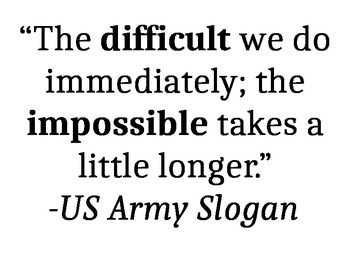
Day 3 – Residency
“The difficult I do immediately. The impossible just takes a little longer” (n.d.). Today we watched a video about doing things that are hard. I am not sure where the quote above came from. I recall hearing it in 1997 while in electrical engineering school. Although I did not complete electrical engineering school, it was not because it was difficult. It was because Microsoft released Windows NT Server and I was intrigued. This was my transition from electrical engineering to systems engineering.
This quote has been used several times to get me through many things in life. I am a little different from most. Everything I start, I usually finish. This is in part to how I was raised. I will admit, I evelauate task before taking them on to assess the difficulty. The next step is to determine if the task is something I can do immediately or do I need to plan a better time to complete that task.
I will admint, being in a room with 26 other people with the same goal of graduating from this program was a weight off my shoulders. I have been enrolled in doctoral programs before where I was on an island alone. I did not have my project topic in mind and was glad to learn that I was not the only one. We discused imposter syndrome earlier in the class and being amoungst peers helped alleveate some of the imposter syndrome. Then, the computer science department entered the room. To the general public, computer science, information technology, and management information systems are very similar fields. To those of us who work in information technology, we know there is a clear separation between the fields. When Dr. Kwak started talking about his research interested and R programing, imposter syndrome quickly set in again. I felt like I did not belong in the room. I felt like the program was going to be very difficult at that point. After talking to my peers I discovered we all had the same feelings. So as I progress through this program one day at a time I will keep repeating the same phrase. “The difficult I do immediately. The impossible just takes a little longer” (n.d.).
Day 2 – Residency
I got an early start today. I arrived on campus an hour early to talk to other students. It’s starting to look like I am an extrovert when among introverts. I was doing most of the talking and asking most of the questions.
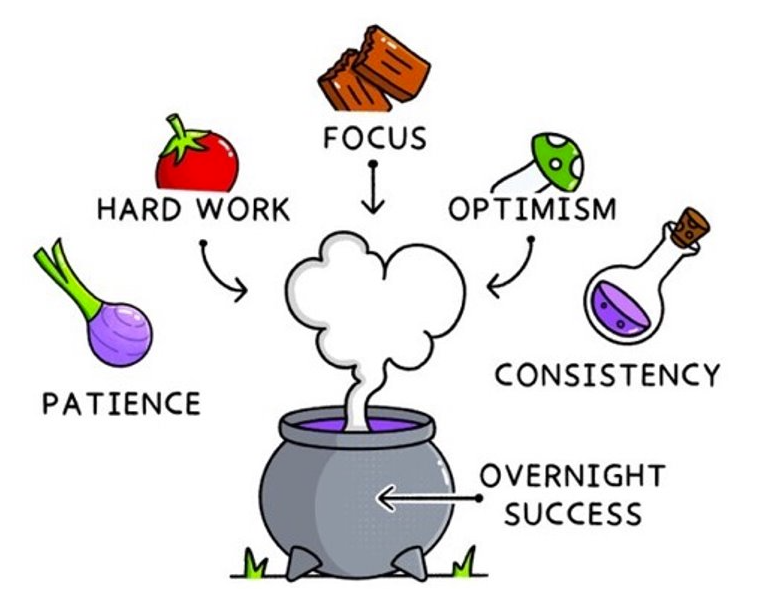
When I look at the picture above the first word that comes to mind is perseverance. All of the words in this picture collectively represent perseverance. Having patience is a form of perseverance. The act of waiting for something to happen or for someone to arrive is a skill. It takes hard work to persevere. Even when times are hard, energy is low, or you just don’t want to do anything; you have to push through and work hard to get to the other side. Staying focused and being optimistic are two great characteristics to get you to the finish line. Being consistent with what you are doing may not be a guarantee that it will get done, but you are closer to getting it done than not doing anything at all. These things combined do not make you an over night success, however, they put you on the right track to accomplishing your goals.
Speakers for the Day
Up first today was Dr. Koohand the Dean of the School of Computing. The first thing he said about the research courses is, “they are very demanding.” On a subsequent slide he posted, he stated that several things were vital requirements to this program. The first was time management. This is one that I am familiar with from working multiple jobs and being enrolled in college. Curiosity was another one that was listed. I have always been curious. At the age of 7, I took apart a radio alarm clock to see how it worked. I was shocked by the electricity, but it only piqued my curiosity more. I often ponder how to make technical things better through continuous improvement.
Creativity and curiosity go hand and hand in my opinion. If I am curious about something my creativity kicks in as previously mentioned and I start thinking. I am very disciplined and I am much harder on myself than anyone else. I typically finish what I start regardless of how long it takes. In regard to productivity, I use the agile method in life. I use sprints to reach my major milestones towards my goals. A milestone would be completing each course. My sprints are the reading and writing I must do to accomplish my milestones.
Dr. Lingelbach was the second speaker with helpful tips for doctoral students. There were a few major takeaways from the handout she supplied. The first one that stood out to me was rest. I have very poor sleep quality. I have been in several car accidents and my spine is twisted in several directions. I strongly believe a nerve is pinched as I cannot naturally fall asleep. I have to take a supplement to go to sleep and sometimes I still wake up at 4 am. Then from 4 am until 8 am I am in a restless sleep. I must get that looked at as soon as possible to prevent brain fog for most of the day.
Do not isolate also stood out to me. This is where the introvert stands out. I am perfectly fine being on an island by myself. I do not find that it creates fear, however, I am going to take her word for it. She stated there are studies that prove being isolated creates fear. De-stressing is probably going to be my biggest issue. I tend to lead a somewhat stressful life already and I have learned how to manage it. It’s the unforeseen stress that creates stress for me. I am sure I will do well taking 2 courses at the same time. What I am unsure of is what will slip through the cracks with trying to prioritize.
Dr. Alan Stines spoke about his teaching philosophy. One slide he posted was a meme that stated, “Documentation is a love letter to your future self.” I am a firm believer in this statement. Working in information technology I often end up doing the same things over and over again, but not necessarily at a frequency that can be memorized. For this, I created a document library where I create how-to documents and store them in the library. Now, I do not have to recall steps on how to do something. I simply check my document library.
Day 1 – Residency
Anxiety!
I barely slept last night. There were mixed emotions. I was excited to meet my cohort and I was also terrified. This doctorate is a big step for me and I want to ensure that I gain all of the required knowledge and skills to be successful. So what happened? It was awesome! There is something about being in a room of highly educated people all with the same goal. It was inspiring. I felt like I was where I belonged. All of us were terrified about the 2 courses simultaneously for 8 weeks. I think I will still be terrified until after those first two courses are completed. My fear is not the courses themselves. My fear is all of my other obligations on top of being in a doctoral program.
Creating a time management schedule for the first course along with my obligations was ok. Everything seemed to work well and the rigor was just enough to introduce the load to my family. After this residency, I will need to sit down and rework my schedule for the fall. I work multiple jobs and run a business. I am going to need to hire someone to lighten the load for my business. Everything else should fall in line as those schedules are more flexible.
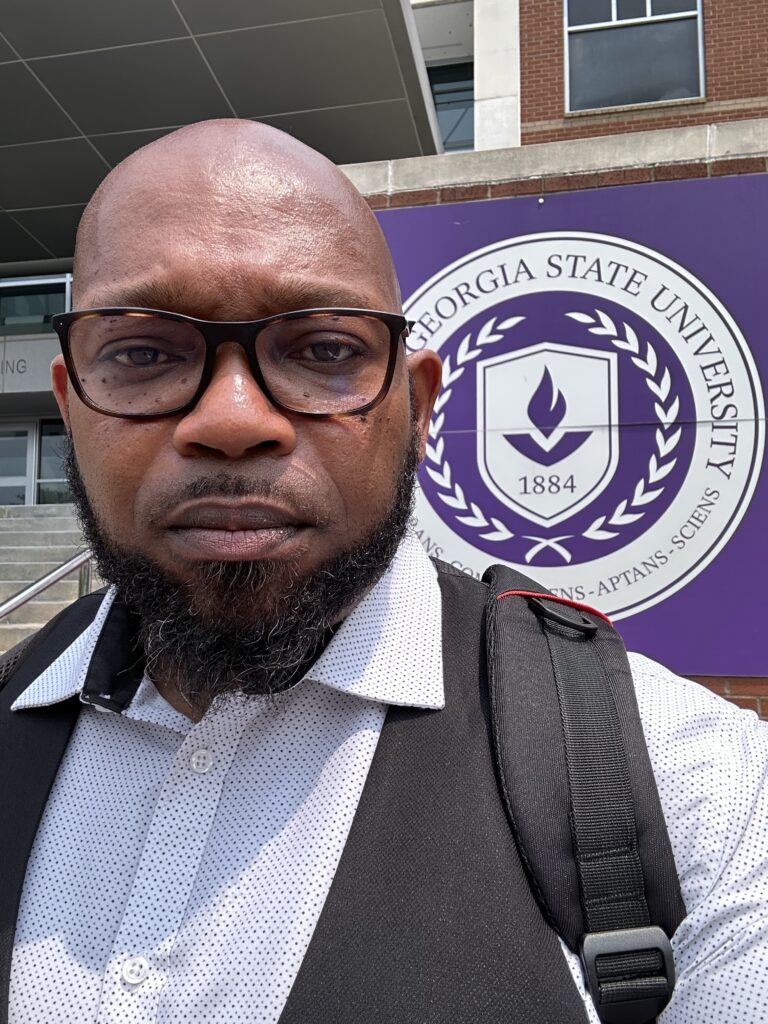
Day 1
I am terrible with names, but thanks to Atomic Habits, I have learned to pair two things together that will help me remember other students until I can remember their names. I know. Why not pair something you know with their name? That does not quite work for me. However, I can tell you which student works for PWC, Georgia Tech, was a mechanical engineer, who sews, who likes to ride ATV’s, who works in cybersecurity at a bank, and who lived in England. I just cannot recall their names except Sebastian because he said his name multiple times and said that is what he prefers to go by. Wes also said the same thing. I have to get better at remembering names. I think this is a side effect of working in information technology for so long. I know computers by their IP addresses and never memorize the names. The numbers are easier for me.
Aside from meeting a room full of great people, I also met several of the instructors. I was familiar with Dr. Sandoval as I have been emailing back and forth with her for a complete year. Dr. Floyd presented some great information as well. I was a little jealous because I started an Ed.D program in Florida, but when I moved to Georgia I was not permitted to complete the program because I was no longer a K-12 teacher. Dr. Spangler seems to have the same personality that I do. I also noted that he was an Associate Professor with a doctorate from MGA. That was enlightening as Kennesaw State University will not offer a tenure track position to professors with professional doctorates. Now I can start doing research for universities that hire professors with professional doctorates. Possibly even start working as an adjunct at one of those schools and resign from another school where I am an adjunct for time’s sake. There was one more speaker whose name I cannot recall. He talked about his doctoral hat and how graduation should be our goal. I should have written their names down because they both had great things to say. On day 2 I will take more notes and hopefully not disturb other students with my typing.
Dickey Farms was pretty nice. I have never had peach ice cream before. It was a little saltier than I expected or it could have been the sweetness of the peach cobbler that made the ice cream taste less sweet. There were two students who witnessed a racist incident while at Dickey Farms. I personally did not witness it, however, one of the employees approached us as we were leaving to as what happened. As I listened to the other student’s account of what happened, I wish I was in the area when it happened. I have had to deal with racism on many occasions and I have found that a simple conversation seems to ease tensions in most situations. Not all situations, racism sometimes is accompanied by hate which can be dangerous. Typically, it is simply a misunderstanding or a personal experience that someone has had which makes them react in a certain way. Either way, day 1 of the residency is complete and I must rest up for day 2. I will be prepared to take notes, ask questions, and learn other students’ names.

J6 – Residency Time
I purposely waited until the night before to write this blog. As I sit in the hotel room as the clock approaches midnight, this residency is a reality. In a few short hours, I will be my cohort and another cohort on campus for the first time. Although I am not fully an introvert, I do not speak in front of crowds unless it is a must.
This has been an excellent course this far. The reading material aligned with the tasks that were due and were beneficial to me as a student. The rigor was enough to keep me focused, but not enough to make me have to choose between working and earning my doctorate. The work, school, and life balance is perfect so far. Part of this can be attributed to pairing my habits together to ensure success. For example, one of my goals is to log in and read daily after I have reviewed my task for work for the day. These are two excellent habits to place together. Each morning I check my work email and Microsoft Teams to ensure I have not missed anything. If there is work to do I create a schedule for completing the work, then read the assigned reading material for class. This was something I was kind of doing before, but I am more conscious now and look forward to pairing additional habits alongside other good habits.
As I enter the residency, I keep repeating to myself, “You are only facing what others have met.” This is not my first time in college or working on a doctoral program. This is the first time I am working on a doctoral program in my field of study and I am excited. I am also terrified because I know my plate is full. I am excellent at time management, however, taking two courses at the same time while working is something I have not attempted in 30 years. I am going to need to remove something from my schedule and I am unsure what that is at this time. This is going to take some balance.
I do not have any questions at this time. I simply want to gain as much knowledge as possible from this program to be the best information technology practitioner I can be. I am trying to keep my expectations at a minimum to prevent stressing about something I can accomplish without undue stress.
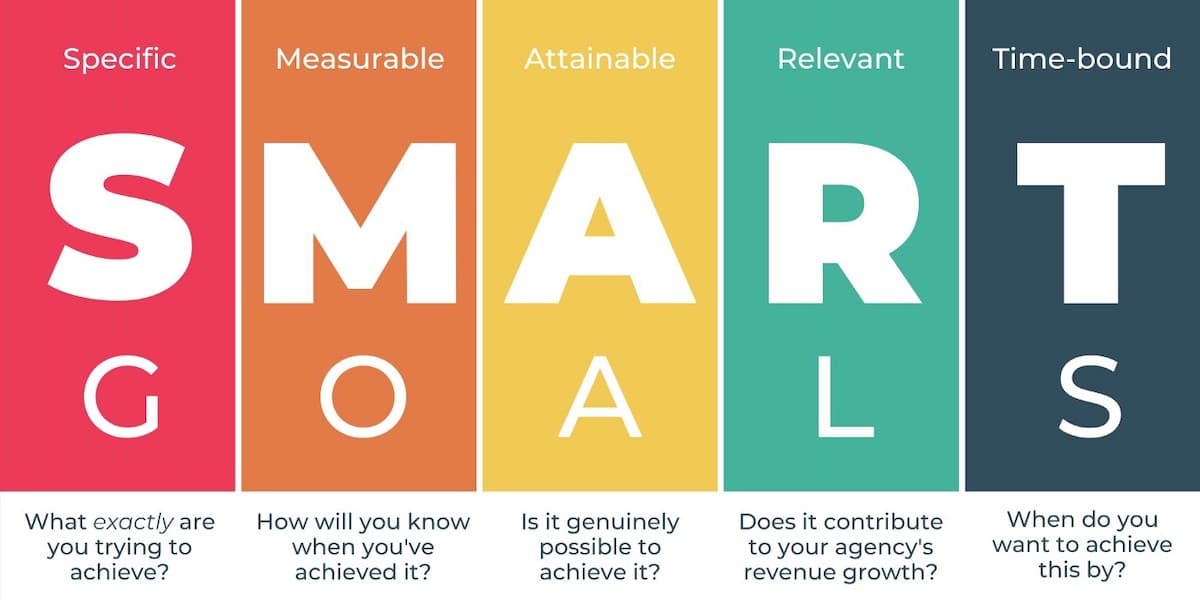
J5 – Know Thy Self
When I think of goal setting, it is something that I have always done and will continue to do. Last year I set a goal to lose 20 lbs. In just under four months I was able to lose 20 lbs which is roughly five pounds per month or one and one-quarter pounds per week. The first goal was to reduce my diet by 500 calories per day. This was done by setting a goal of not eating breakfast and making my first meal at noon each day. My second goal was to burn 500 calories per day in the gym by doing high-intensity workouts. By sticking to my milestones and diet, I was able to lose 20 lbs. Unfortunately, I have found those 20 lbs again by eating breakfast every day and not working out for an entire year.
When it comes to goals for my doctoral journey, it is a little different. It is more like running a marathon. As I look at the route for my doctoral marathon it is a 2 year event. Much like a marathon, I must set milestones along the way to show progress and completion. This is a 2-year degree which is a total of 104 weeks. We are currently in week 6 which means 98 more weeks to go. Each week there is reading material and an assignment. To stay focused and on tasks, I set daily reminders on my calendar to keep me on track. I have to dismiss the reminder after completing the task or I will be reminded again throughout the day.
On Mondays, I log in and review the material for the week. Based on the amount of reading material I determine if I am going to read it all in one day or in two days. If the reading is one or two chapters, I will complete that on Monday. If the reading is from multiple sources I will schedule to complete the readings on Monday and Tuesday. If there are discussion posts, I like to complete those on Wednesdays. This gives other students a chance to read and respond to the post. It also gives me time to respond back to those students. On Thursdays, I will read and respond to other students’ discussion posts. On Fridays and Sundays, I typically relax and on Saturday mornings I will complete any remaining assignments. This works very well with my hectic work schedule and provides time for me to spend with my family. It also gives me a rhythm to follow week after week and helps to not focus on the remaining 98 weeks to go.
These weekly goals work very well for me. Unfortunately, when working on a degree online it feels like I am on an island alone. I wake up, do my morning routine, check my emails from work, see if I have any meetings and if not I start working on my doctorate. Very few people know that I am working on a doctorate as my support system is very small. I have accomplished many great things in life already and some people feel that I don’t need anyone’s support. They are partially correct. A lack of support is all the drive I need to reach my goals. Just because I know there are people who don’t want me to succeed, forces me to want to succeed.
I do have an excellent yet very small support system. My girlfriend knows that I need extreme quiet when I am reading and completing assignments. She does her best to keep the home quiet and I compromise by trying to complete my assignments when our daughter is at school or camp. Providing me with quiet time is all the support I need from her at this time. My mother is a huge support. She texts me every morning to encourage me to stay the course and complete this doctorate. She also mentioned to Dr. Harvey at my old Church that I was working on my doctorate. Dr. Harvey sends encouragement through my mother to keep going until I am done. Dr. Bobbie works with me at Kennesaw State University. He always asks for an update on my doctorate when he sees me on campus. Dr. Bentham is a close friend of mine who started her doctorate in 2013 when we worked together. I was her encouragement all the way to the finish line. She is there for me as well. There are a few others, but those mentioned have been there for me since I first mentioned earning a doctorate degree. These are my personal and professional accountability partners.
I am going to reach out to more doctoral faculty at Kennesaw State University and see if someone is willing to mentor me. The goal of mentorship would be to have an accountability partner that can keep me accountable in this program but also show me what I will be doing once my degree is complete. It seems like a long time, however, I watched a co-worker complete this program and it seemed to go by so quickly. I also have another co-worker who started this program last year and has a year to go. Soon I will be crossing the stage with my doctorate degree and I want to be able to hit the ground running.
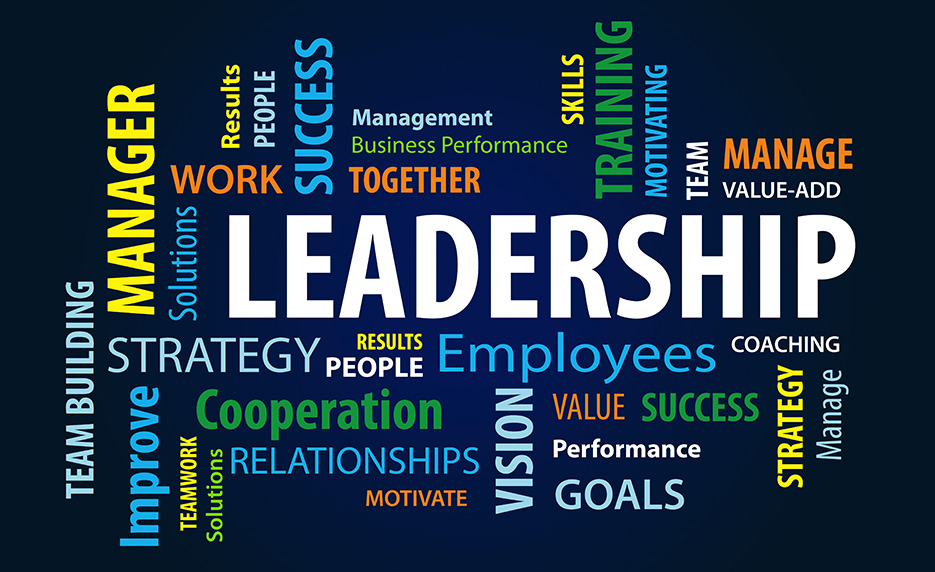
J4 – Leadership Identity
I was a leader before I knew what leadership was. As I kid I would be the one to gather the kids in the neighborhood, propose a game to play, and we would play the game. In Church, I was asked to teach Sunday School at the age of 12. I had the ability to read the material, decipher, paraphrase, and teach other kids about the bible. In college, I was the only one with a computer. I would type papers for other students for $25 per paper. I started my first information technology company also while in college. I have also started multiple companies that we mentioned in previous blogs. What is the common denominator? Leadership skills!
Typically when I walk into a room, I command the room. I do not do it on purpose, it’s something that has been with me all of my life. I carry myself with high confidence. If I do not know something, I will find out and disseminate the information. If I know something, I confidently disseminate the information. This in my opinion is a great leadership trait. I also have a genuine concern for educating others which is why I chose the profession of being an information technology and cybersecurity professor. A professor is a leader and has an influence on many students.
One leadership characteristic that I possess that will also benefit being in a doctoral program is active listening. To be a great leader as a professor I have to listen to my students, understand their concerns, then address their concerns. As a doctoral student, I must be able to listen to my professors and ask questions to ensure I am on the right path in this program. I want to gain as much knowledge as I can to become a better leader within the information technology industry.
My attitude and behavior exhibit leadership characteristics. People will naturally follow others with a good attitude and have stellar behavior. That is not a golden rule, but a general rule. I can enter my classroom and sit in the back of the classroom. I do not have to identify myself as the professor as students will naturally self identify as students. As they look around the room, there are suttle things that show that I am the professor. I am dressed differently from the students. I address each person as they walk in the room and have small conversations. I ask questions to get to know my students better. The questions that I ask as well as the follow up questions identify me as the professor. Once I walk to the front of the classroom and start the class, my students immediatly give me their undivided attention.
Do I need to change any of my leadership skills? I think change is a good thing. There are things that I can learn to make me a better professor and leader. One of the things I do to strenghthen my leadership skills is review my course evaluations. My goal is identify what went well, what went wrong, and what I can do better in future courses. This has made me a better professor term after term. There is one thing I plan to change when my doctorate is complete.
I plan to broaden my leadership identity through books and speaking engangements. Currently, very few people know the full bredth of my knowledge and leadership skills. Once I hace obtained my doctorate I would like to speak to middle school students to get them focused on their future careers. This allows them to focus more on certain subjects to ensure they are not missing any critical information. I plan to speak at graduations to motivate students. I would like to speak at conferences as I have a unique ability to think of things that others do not. I also challenge converstations with others to ensure that the information is being presented accurately. In short, the world will know who Dr. Foster A. Scotland is and what he stands for.
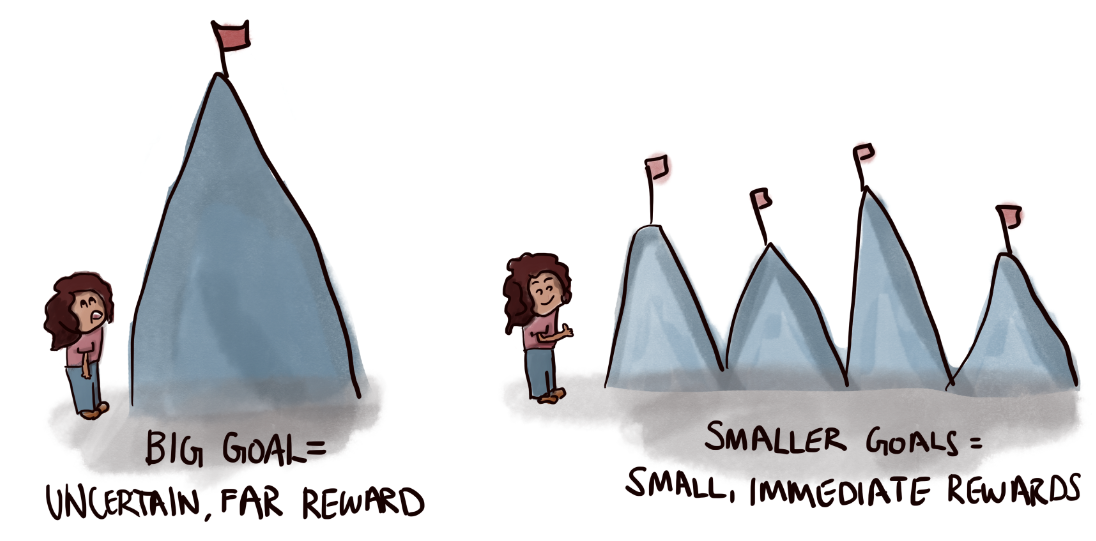
J3 – Immediate Rewards and Long-Term Rewards
I have been asked to reflect upon the statement: “Success is the result of prioritizing long-term desire over short-term gratification.”
I have been setting goals since I was a child. I really didn’t know what I was doing, but when I said I would do it, I did it. I wanted to be the best baseball player on my team. I practiced hard and I practiced in every position to learn which one I could play best. Once I identified that I was an excellent pitcher, I set a goal to be the best pitcher on the team. I accomplished my goals and became an all-star baseball player. Once I was older and in college, I knew what goals were and how to properly set them.
I set long-term goals with several short-term goals to reach my long-term goals. One of my long-term goals is to become a tenure-track college professor. A second long-term goal is to own a 7 figure cybersecurity company. A third long-term goal is to retire in the Dominican Republic. What does this have to do with prioritizing long-term desire over short-term gratification? These three goals span many years. With the first goal being a tenure-track college professor, I knew I would need a terminal degree. I wanted to teach business and entrepreneurship. I knew the degrees required would be a bachelor’s, master’s, and doctorate in business administration. While working on my bachelor’s degree, I worked in information technology. Once I completed my bachelor’s degree I immediately started my master’s degree. The bachelor’s was a short-term goal to get to the master’s.
A bachelor’s degree is an excellent accomplishment. To many, it is the last degree they will earn. I was working in information technology and my salary at the time was the same as a college professor. Short-term gratification would have been celebrating the win of earning my bachelor’s and having the salary I would end up with as a professor. My long-term desire is/was to become a tenure-track college professor. I took my time earning my master’s degree as I wanted to ensure I had a solid foundation as this would be the subject I would be teaching in the future.
During that same time frame, I started an information technology company. I took the skills learned in class along with my past experience in information technology and put them together. I quickly acquired four clients and hired one systems engineer. My company was doing well and I made a trivial mistake. I thought with a master’s degree I mastered the skill of running a business. I went on to start a successful mortgage and trucking company. I was on track to earning 7 figures and was very happy with my life. I strayed from the path of my long-term desires and settled for short-term gratification. Running three companies in three different industries seemed like a breeze. I did not have a supervisor or any buffer between me and my employees. The money was great, but I did not have any free time. No one saw me as I was working all of the time. I had lost focus and was no longer enrolled in my master’s program. Then, life happened.
The mortgage industry turned upside down and I went from closing a deal every 3 days to NOT closing any deals. That was an immediate loss of income. The trucking business was doing very well. I had ten trucks on the road. Then diesel went to $4.95 per gallon. After paying all of the expenses and employees, the profit was zero dollars. I had a hard decision to make, but I did it. I closed the trucking company. Neither the mortgage company nor trucking were goals. They were distractions that delayed me from completing my goals. The short-term gratification blinded me. I decided to re-enroll in my master’s program.
Upon completing my master’s in business administration, I started working as a college professor. This is why I stated is/was when describing the college. I have accomplished steps toward reaching my long-term goal, and this doctorate is the final step. With two degrees in business and 16 years of information technology experience, I was asked to teach information technology. I was extremely good at teaching information technology. I modified my long-term goal from teaching business to teaching information technology. This changed my doctorate from business administration to information technology as well.
The moral of the story is, setting short-term goals to reach your long-term goals is an excellent strategy to briefly have short-term gratification, while still working on your long-term desire. It’s the equivalent of taking a break while climbing a mountain. If the long-term goal is to reach the top, the break is a short-term celebration until you reach the top.
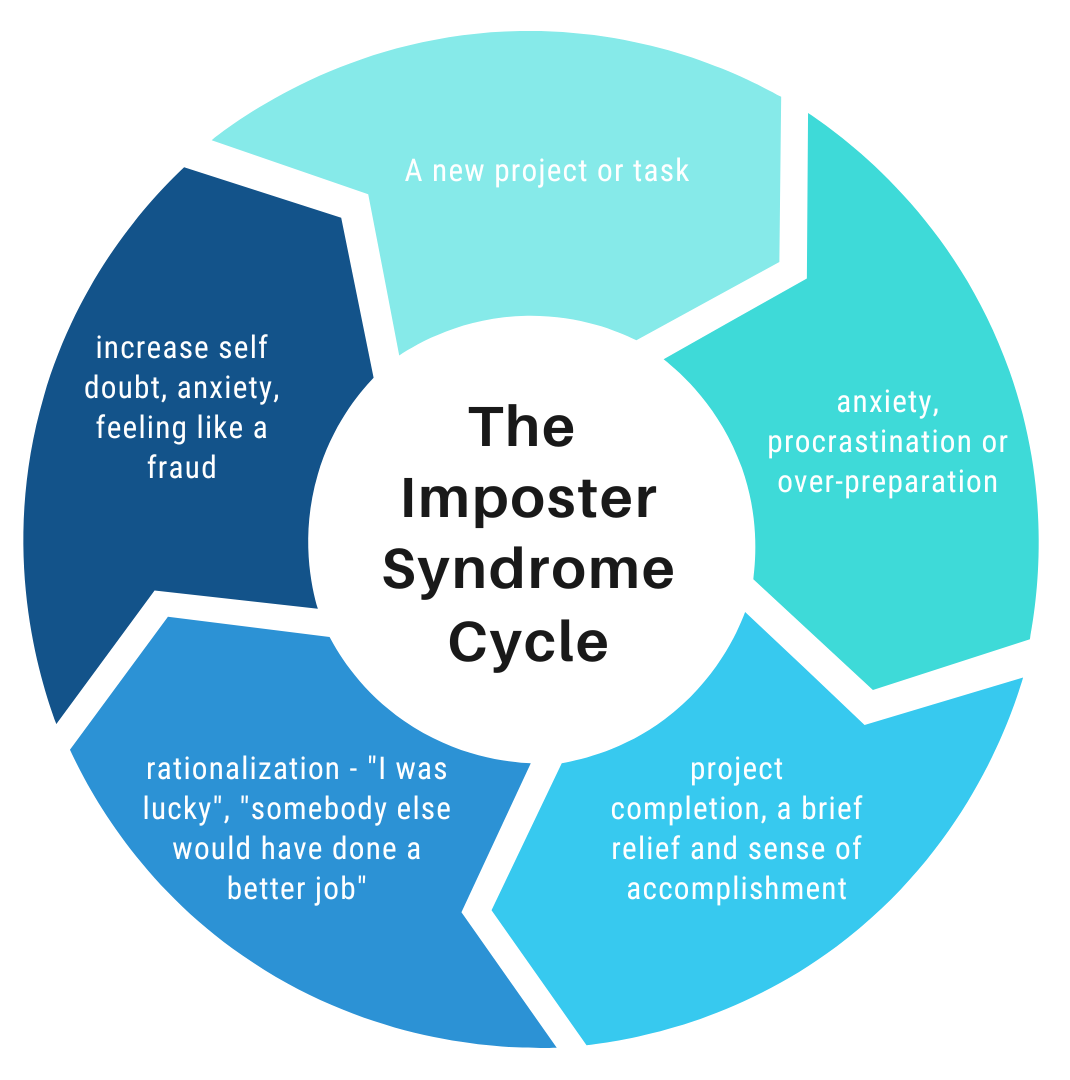
J2 – Imposter Syndrome
Whenever I hear the word “imposter” it reminds me of Scooby Doo. Whenever they caught a bad guy it was an “imposter” in a costume. So what is “imposter syndrome”? It means you feel like you are somewhere you don’t belong or you have achieved something that you do not believe you deserve.
I grew up in a small town with a population of 6500 people at the time. Everyone knew each other and it was peaceful for the most part. There were four career paths; chemical plant worker, orange processing plant worker, school teacher, and nurse. My father was a chemical plant worker and he did not want that life for me. At the age of 7, he purchased my first computer. It was a Commodore 16 which connected to an XGA monitor. That means it was black with green writing. There were two of us in the city that had computers; me and Mark Hanson. I told you it was a small town.
Over the years I learned everything I could about computers. As a freshman in college, I worked a full-time technical support role for a local internet service provider. By 19, I was a project manager working with electrical engineers at a power company. At 23 I was the director of information technology for a forensic science company. I was doing well for a kid from a small town of 6500 people. There was just one thing that stood out. I was the only African American working in roles of this nature. Did I choose the right career path? I felt like an imposter, in more than one way.
As people, we tend to compare ourselves to others. It is natural to want to compete and win. I worked hard, read books, and built labs so I could constantly gain a better understanding of information technology. My friends were still navigating life and identifying what they wanted to be as adults. I was already working in the field of my choice. I also held a very high-ranking position at a very well-known company at the age of 23. What was the problem? I was not getting the accolades that others were getting. Was I underperforming? Was I not good enough? Was I an imposter suffering from imposter syndrome?
I indeed had imposter syndrome until I met a gentleman by the name of Cary White. Mr. White was an older African American man who worked a full-time job and owned his own information technology company. We sat down and talked about my accomplishments. Mr. White was very impressed. In fact, until that moment, no one that looked like me or otherwise seemed impressed. Mr. White put me and the imposter face to face and allowed me to see who I really was. I could accomplish anything I set my mind to.
How do you avoid the traps of imposter syndrome?
Acknowledging imposter syndrome is one of the first steps to freedom. One must be able to conduct a self-evaluation and identify if they have any of the characteristics of imposter syndrome. How does it make you feel? Do you want to do something about it? No one can be a better cheerleader for you THAN you. If you are performing tasks at work that no one else has ever done, celebrate yourself. Acknowledge that you are capable of doing the impossible. Be proud of yourself and your accomplishments. Uplift is the key.
Another trap that can increase the chances of experiencing imposter syndrome is competing or comparing yourself to others. It is natural to desire to be the best, however, in order to be the best one must compete against others. What if you competed against yourself? In my next blog I will be discussing setting short term goals to reach your long term goals.